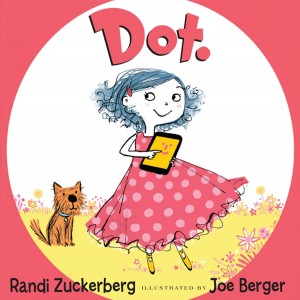Tech-free life has its benefits
Technology can feel burdensome after a while, since smartphones and social media make it so that you’re unofficially on call 24/7 for your friends, family, peers and professors.

Cautionary tale · Randi Zuckerberg’s Dot. tells the story of a young girl who learns to live her life without being dependent on electronic devices. – Photo courtesy of Random House Publishing
Even Randi Zuckerberg, whose brother, Mark Zuckerberg is the founder of one of the largest social network enterprises in the world, agrees that we’re all getting a little too caught up in our devices. Zuckerberg recently wrote Dot., a children’s book about a tech-minded girl who learns to put down her tablet and enjoy the great outdoors.
It sounds like a charming story with a great lesson, considering we live such wired lives. It isn’t uncommon to see parents using iPhones in place of pacifiers to calm their crying babies. Even cat owners find that their beloved felines can be easily amused by koi fish or mouse apps on their iPads.
Despite the seemingly feel-good nature of Dot., the book is rather a testament to how absurdly attached we are to our technology. To shed some light on this obsession, Time magazine and Qualcomm conducted a survey about our smartphone habits. For example, more than 80 percent of people ages 18 to 24 years old sleep with their smartphones next to them. And if you feel like you check your phone too often, at least you’re not alone — 20 percent of people check their phones every 10 minutes.
In July, Fast Company published a complete guide on how to “#Unplug” — in other words, how you can take a digital hiatus successfully. Like Dot., #Unplug is a yet another push toward slapping a Band-Aid on the deeper issue of tech hoarding.
Though the intentions behind the guide — to get people to reduce their overall digital consumption — are genuine, it generally sounds silly. Sure, you’ll miss a lot of emails, but a brief digital detox won’t dramatically change your life. It shouldn’t have to take a full-fledged guide to tell you how to put away your smartphone for a bit.
I, unfortunately, cannot attest to unplugging. For college students, email plays an essential role in just about all aspects of life, including classes, internships, organizations and more. A day without checking my inbox could mean missed opportunities or forgotten homework.
On the other hand, Paul Miller, a senior editor at The Verge, can relate.
Starting in May 2012, Miller took the challenge to live completely offline for a whole year while still getting paid as an editor. A year later, he wrote about his triumphs and tribulations in a long-form feature that went up on the publication’s website the day he was back on the Internet.
Predictably enough, Miller’s first few months offline allowed him to pay more attention to his friends and family, as well as pick up more than a few books to pass the time. As time went on, however, loneliness started to kick in — a result of his lack of access to any form of social media — and became his reason for appreciating the Internet again. The last line of his feature, in fact, reads: “But at least I’ll be connected.”
The tone Miller uses to describe his yearlong endeavor is more appropriate for accomplishing a feat like scaling Mount Everest. And it seems ridiculous, in a way, that Miller had so many highs and even more lows during this year without Internet.
And despite the fact that “unplugging” or “digitally detoxing” seem easy enough, we’ve become so used to having sources for Internet access that suddenly getting away from it could be unnerving and extremely isolating.
Miller was still able to work as an editor at The Verge and still managed to communicate with his team. By the end of the challenge, however, Miller was mentally worn out and emotionally zapped from not being able to communicate with his friends and family for such a long time.
Thirty or so years ago, relationships were built on in-person contact and by phone. Conversations took time and effort, and most likely made human interaction more meaningful.
These days, much of who we are is reflected on social networks. We communicate to each other through cat videos, Buzzfeed links and emoticons, not just through words. We celebrate push notifications because they serve to remind us that, in one way or another, we’re connected and we’re wanted.
The Internet is much more a part of our lives than we realize. Though these efforts to go without the Internet sound a bit ridiculous, it’s more difficult to do than it seems. As I write this column online on Google Docs, my phone starts buzzing away to signal incoming emails. It’s all starting to feel a little overwhelming, and I’m deciding whether or not to try unplugging for a bit. But a notification from Facebook pops up from a friend who published a link to a Tumblr post of cat GIFs.
Maybe I’ll unplug another day.
Sara Clayton is a junior majoring in public relations. Her column “Tech Today” runs Tuesdays.
Follow Sara on Twitter @saraclay15
